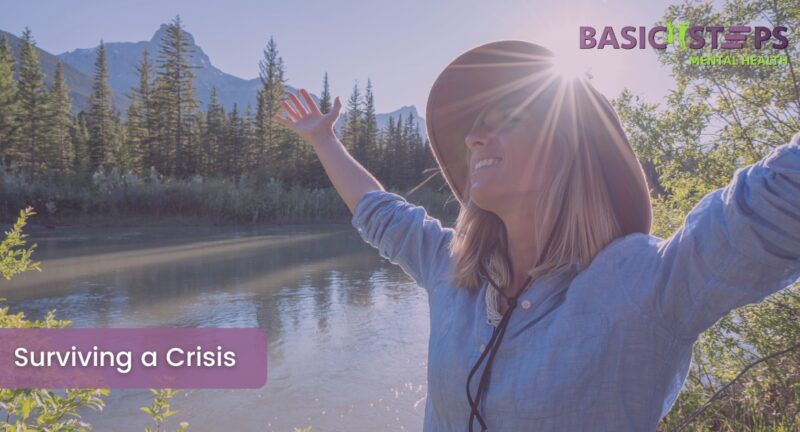
Trauma Treatment
Trauma treatment needs to be handled carefully, or a person can be re-traumatized again and again. This has been happening to a person I am treating in family therapy, by their personal counselor. The old models of healing trauma can cause more trauma because, in an approach named Gestalt therapy, a patient is asked to relive the situation from as many angles as possible.
Regression is a process in which a person will revert to a younger stage of development during periods of incredible stress. Trauma therapists can actually cause this stress if they ask a client to remember, in detail, a time in which they were overwhelmed.
Working at a crisis center for 11 years and seeing over 7,000 people there, you learn to proceed very gingerly when a person has gone through trauma. In order to heal, it is important to build up a person by focusing on the part of them that went through the experience, but not highlighting the experience itself. If the incident happened a day before, then efforts need to be made to support the ‘day-before self’ through love and tenderness. We, as helping professionals, can’t heal people—that is their job. In order to heal, they need to be the ones to apply love to themselves through words and actions. For example, getting them to hug their day-before self and tell him or her that they are with them and love them. If, by chance, they don’t know how to be loving to themselves, then ongoing treatment is necessary to establish this.
The cases I have treated are normally related to early childhood trauma. These are nasty and take ongoing effort to heal. It is not about making the person remember the acts that took place, but about scooping up the younger part inside of them and treating that person within who has been cowering inside for, sometimes, decades. All mental illness has its roots in early childhood experiences, and with early childhood trauma, it is not uncommon to experience difficulty coping in life, confusion, or blanking out when overwhelmed. If you suffer from panic attacks, rage, and thoughts of wanting to die, these in particular point to early childhood difficulties. Sound familiar? For those of us who have suffered trauma and/or abuse, this regression can be a regular occurrence.
Suicide is a real issue for people who have suffered trauma. Often, this urge can linger in the back of one’s mind. I have heard countless times the victims of early childhood abuse tell me that they were too chicken to make the gestures, but if they didn’t wake up in the morning, that would be okay.
People who suffer from serious trauma often avoid the treatment they desperately need. Many turn to substances to numb themselves because who knows what a professional will do? Many fear getting locked up because that’s what happens to people who have reached out to professionals, told them they’ve had thoughts of suicide, and, because of this, have ended up in a psych ward. For years, my job involved placing people on a psychiatric “5150” hold, in which they are removed from the public for 72 hours. I received training for this. I was treating the worst-case individuals, and many wanted to be in the hospital because they couldn’t trust themselves. But for the people who were suicidal but didn’t want to kill themselves, I recommended counseling only. It took a lot for me to write out a hold on another human being, because we all have basic rights, and I didn’t want to overstep theirs. Once a suicidal person agreed to go through therapy, they were given the following homework assignments and asked to contact my office if the desire to kill themselves became too overwhelming.
Before I continue, let me remind you that people heal. The model of Spiritual Psychology is: “When love is applied to hurt, we heal.” This is a revolutionary model that guides me through crisis work to this day. This love is innate in every person, and here is how to do so.
- Pillow Work
If your wounds began from the time you were an infant, grab a pillow and imagine it is the baby you. How would a parent give love to an infant? Treat the pillow this way. Hug and kiss the pillow. Talk to the pillow and give it kind words. Read a bedtime story to the pillow-you. Again, when love is applied to hurt, we heal.
- Opposite Hand Writing
To talk to your younger self, grab some paper and write out a conversation with this inner self. Your dominant hand represents you now, and your opposite hand represents the younger you.
Adult (using the dominant hand): Hello, younger me. How are you?
Child (using the opposite hand): I am afraid.
Adult: Why are you afraid?
Child: Because my daddy is mean. He yells, hurts mommy, and hurts me.
Adult: I’m here to help you. What can I do to make you feel better?
Child: I don’t trust you.
Adult: Why not?
Child: Because you never care for me. You make other people more important and harm us with your drinking and smoking.
Adult: You are right. I am sorry. I promise to change that behavior. Please let me help you, I really do care.
Child: I just need you to listen to me. I have felt all alone and like nobody cares. What I really need is a hug.
Adult: Here you go. (Gives the child a hug). I promise to be there for you all the time. Do you want to pick up anything at the store?
Child: I want vanilla ice cream.
Adult: Well, if you want ice cream, we can go to the frozen yogurt place down the street.
Child: (excited) Really?
Adult: Sure. Come on, let’s go.
NOTE: Contrast this with conventional psychology. Here, the focus is not on reliving what the bad guys did to cause harm. Let go of this and focus on treating the victim.
Many people blame themselves for the abuse they suffered because, for so long, the people involved blamed them. Let this go. As a child, you were innocent, and older people did what they did out of their own motivations. It is the mark of a good parent to handle their own stress and emotions and not displace them onto their children.
- Opposite Hand Play
For early childhood trauma that occurred before the age of 9, it is encouraged that people conduct play therapy on themselves. Before age 8, our brains have not fully wired, and experiences before age 9 are not processed properly and are often suppressed into the subconscious. A lot of trauma equals a lot of what is termed “unfinished business.” In order to complete this business, love must be applied to the part of you that went through the experience. The first step in treating your wounded self is opposite hand writing. Next comes the fun part: ask your younger self what they would like to do, and do it. Here are some suggestions:
- Bowling with the opposite hand.
- Miniature golf the other way.
- Eat with your other hand.
- Brush your teeth with the other hand.
Basically, whatever you do with your dominant hand, do with the opposite hand — and, of course, from a heart-centered place.
This is new in the industry: applying love to hurt. The key is to stick with this. This is referred to as re-parenting, and in parenting ourselves, it isn’t a one-shot deal. Ongoing connection is the key. If you have parented children, you know that if you tell a child something one time, they will probably not change. Ongoing parenting will ensure that children understand and grow. Therefore, ongoing parenting of yourself is critical. If you do this one time and leave yourself, you are abandoning yourself like so many others have done before. Go the distance with this. As for me, I checked in with my younger self three times a day: “How are you? What would you like to do? Climb a tree? Okay.”
Does trauma treatment avoid dealing with the person who inflicted harm on you? Oh no. Eventually, when your relationship with your inner self is strong enough, use the opposite hand format to go after the bully. The dominant hand is yours, and the opposite hand represents the bully. If you feel overwhelmed, stop the interaction and immediately care for the needs of the younger you. They are more important than telling the bully off.
Now, it is recommended to seek counseling if this process becomes too difficult, but avoiding addressing this issue at the core will continue to bring you depression, anxiety, paranoia, anger, and thoughts of suicide. Ask yourself if you have it in you to give it one more try—on a daily basis.
There are a few therapists in major cities who practice this spiritual psychology. At the Mental Health Urgent Care Center, this was how I treated people in crisis—never by the old model of making them relive the situation in fine detail, which proved to re-traumatize the person. Spiritual Psychology, on the other hand, proved to heal.
Why do I present this same approach for the past 30 years? Because it worked on me.
Compassionate Care is Always Available
There are many more tools and strategies you can use in your pursuit of happiness. Here is where we come in. Contact us at Basic Steps Mental Health and let us support and educate you on this journey back to your loving heart center. Imagine living a heart-centered life, regardless of what is happening externally. We’d love to be of help.
For 25 years, Dr. Scott Alpert, the clinical director of Basic Steps Mental Health, has treated over 7,000 people with mental health and addiction problems, using a Psychological approach that mixes and matches ten of the top approaches used in the industry. We are here virtually and in-person to help you get through this COVID-19 pandemic and many other difficulties you may be experiencing.
May you have good mental health.
Related Posts
Surviving a Crisis
In 2001, the first Mental Health Urgent Care center in the country opened and...
Independence Day
Independence day. They are just two words but emotionally can mean a lot. If you...




